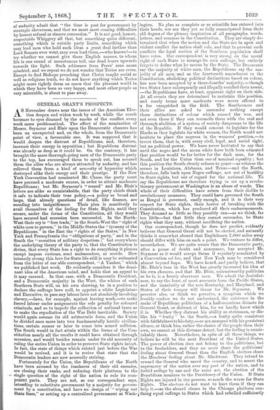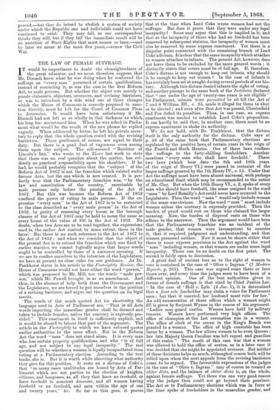GENERAL GRANT'S PROSPECTS.
AS November draws near the issues of the American Elec- tion deepen and widen week by week, while the result becomes to eyes dimmed by the smoke of the conflict every week more problematical. The effect of the nomination of Messrs. Seymour and Blair upon the Democratic chances has been an unexpected and, on the whole, from the Democratic point of view, a favourable one. It was supposed that it would deepen the distrust of Republicans, and, therefore, increase their energy in opposition ; but Republican distrust was already as deep as it could be. On the contrary, it has brought the more thorough-going men of the Democratic party to the top, has encouraged them to speak out, has secured them the allies who are always attracted by audacity, and has relieved them from a kind of necessity of hypocrisy which destroyed alike their energy and their prestige. If the New York Convention had nominated Mr. Chase, the party must have pursued a moderate course, in order to attract moderate Republicans ; but Mr. Seymour's "record" and Mr. Blair's letters are alike so unmistakable, that the party chiefs think it safe to indicate their true policy,—a policy so broad and large, that already questions of detail, like finance, are receding into insignificance. Their plan is manifestly to avail themselves of the feeling for State Rights, until they secure, under the forms of the Constitution, all they would have secured had secession been successful. In the North- West their cry is "free trade," in the South-West the "right of white men to govern," in the Middle States the "tyranny of the Republicans," in the East the "rights of the States," in New York and Pennsylvania the "obligations of party," and in the South the "cessation of military despotism ;" but everywhere the underlying theory of the party is, that the Constitution is divine, that every State has a right to do everything it pleases except impose customs, send ambassadors, or secede. How intensely strong this love for State life still is may be estimated from the letter of our able correspondent, "A Yankee," which we published last week. He evidently considers it the domi- nant idea of the American mind, and holds that an appeal to it may succeed. In that case, with a Democratic President, and a Democratic majority in the West, the whites of each Southern State will, on his own showing, be in a position to declare the suffrage laws null, to appoint a white Legislature, and Executive, to pass any labour laws not absolutely involving slavery,—laws, for example, against leaving work,—to make forced labour under assignments the sole penalty for coloured criminals, and so to impede the collection of national taxes as to make the repudiation of the War Debt inevitable. Society would again assume its old aristocratic form, and the Union be divided once more into two fundamentally hostile civiliza- tions, certain sooner or later to come into armed collision. The South would in fact attain within the forms of the Con- stitution nearly all the results it could have obtained through secession, and would besides remain under its old necessity of ruling the entire Union in order to preserve State rights intact. In fact, the state of things which existed just before the War would be revived, and it is to revive that state that the Democratic leaders are now avowedly striving. Fortunately for the Union, the Republicans of the North have been aroused by the frankness of their old enemies, are closing their ranks, and reducing their platform to the single question of the right of the nation to rule its com- ponent parts. They are not, as our correspondent says, intending to substitute government by a majority for govern- ment by a constitution, and have no design of "wiping out
State lines," or setting up a centralized government at Wash- fining equal suffrage to States which had rebelled sufficiently
ington. No plan so complete or so scientific has entered into their heads, nor are they yet so fully emancipated from their old dogma of the plenary inspiration of all paragraphs, words, letters, and commas in the Constitution. They are simply de- termined that when the nation and the State are in open and violent conflict the nation shall rule, and that to prevent such conflicts the loyal section of the Southern population shall have votes. Our correspondent is very strong on the moral right of each State to arrange its own suffrage, but entirely forgets to define what he means by the State. The Democrats say the majority of white men, the Republicans say the ma- jority of all men, and as the fourteenth amendment to the Constitution, abolishing political distinctions based on colour, has now been accepted by a three-fourths' majority,—though two States have subsequently and illegally recalled their assent, —the Republicans have, at least, apparent right on their side. At all events they are determined to maintain this position, and surely terms more moderate were never offered to a foe vanquished in the field. The Southerners and their allies are asked to surrender nothing except those distinctions of colour which caused the war, and not even those if they can reconcile them with the real and thorough abolition of a system of society dangerous to the life of the Republic. If they would consent to legislate for the Blacks as they legislate for white women, the North would not hesitate to place the negroes in the womens' position,—to invest them, that is, with every civil, legal, and social right, but no political power. We have never hesitated to say that until the negro and the mean white have both been educated that position would be far better for the dark man, for the South, and for the Union than one of nominal equality ; but this position the South clearly refuses to grant—as witness the scenes in Louisiana, Alabama, and Texas—and the North, therefore, falls back upon Negro suffrage, not out of hostility to State rights, but out of regard for the national life. To say the Republicans are therefore trying to set up a revolu- tionary government at Washington is an abuse of words. The whole of their difficulties have arisen from their dislike to revolutionary measures. They could have governed the South as Bengal is governed, easily enough, and it is their very respect for State rights, their horror of breaking with the Constitution, which has produced all their embarrassments. They demand as little as they possibly can—as we think, far too little—but that little they cannot surrender, be State rights what they may, without sacrificing the nation.
Our correspondent, though he does not predict, evidently believes that General Grant will not be elected, and naturally thinks it somewhat absurd that Englishmen 7,000 miles away should differ with him on such a point. We venture to differ, nevertheless. We are quite aware that the Democratic party, after a pause of doubt and annoyance, has accepted Mr.
Seymour as it would accept Satan if regularly nominated by a Convention ad hoc, and that New York may be considered almost beyond hope. We have heard, and partly believe, that Mr. Blair's tour in the West has greatly increased his idea of his own chances, and that Mr. Blair, untrustworthy politician as he is, is a keenly observant man. We admit the doubtful- ness, to say the least, of most accounts from the Pacific States, and the unanimity of the vote Kentucky, and Maryland, and States of their temper will throw for Mr. Seymour. We perceive also, or think we perceive, a symptom which we frankly confess we do not understand, the existence in tho ranks of Republican politicians of a half-conscious distaste for General Grant, or distrust of him, for we hardly know which it is. Whether they distrust his ability as statesman, or dis- like his " lenity " to the South,—a lenity quite consistent with faithfulnessto his duty,—or are annoyed with his persistent silence, or think him rather the choice of the people than their own, we cannot at this distance detect, but the feeling is unmis- takably there. Nevertheless, in spite of all these things, we believe he will be the next President of the United States. The power of election does not belong to the politicians, but to the freeholders, and they no more share the politicians' feeling about General Grant than the English electors share the Members' feeling about Mr. Gladstone. They intend to reward the General who saved the country, and to assert the supremacy of the nation over any part of the nation, and to forbid serfage by one and the same act, the election of the Republican nominee to the Presidency of the Union. If State Rights are injured in the process, so ranch the worse for State Rights. The electors do not want to hurt them if they can help it —as the absurd clause in the Chicago platform con-
proved,—bat they do intend to abolish a system of society under which the Republic one and indivisible could not have continued to exist. They may fail, as our correspondent thinks they will, but if they fail the immediate result will be an assertion of State Rights that must sooner or later,—and by later we mean at the most five years,—renew the Civil War.































 Previous page
Previous page